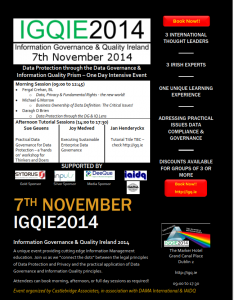When I was Director of Publicity for IAIDQ I introduced a policy of writing up the events of conferences the Association ran or was taking part in. This write up was usually published in the IAIDQ journal/Newsletter. Joy Medved has asked if I could let her do the same here so she can thank the people who helped make IDQS14 happen. As she no longer has access to the IAIDQ to publish content, and given the erratic nature of IAIDQ communications, I’m delighted to oblige to let Joy say a deserved “Thank You” and an undeserved “Good Bye”.
An Overview of the International Data Quality Summit,
Richmond, VA, USA, October 6-9, 2014 (by Joy Medved)
When I was first presented with the opportunity to become Director of Events for IAIDQ, I found the challenge of chairing a conference quite exciting. I have been a conference speaker since 1993 and really liked the idea of expanding my experience in this area. Thankfully, I was working with two extremely well-organized individuals, Alex Doyle and Melissa Hildebrand. Together, the three of us plotted and planned, and were able to outline an exciting program for what was to become the first joint conference of the International Association for Information and Data Quality (IAIDQ) and the Electronic Commerce Code Management Association (ECCMA). Melissa and I decided to call this joint adventure the International Data Quality Summit (IDQSummit.org).
Alex’s main responsibilities centered on contract negotiations with the hotel (though he proved instrumental in a number of other ways!), and Melissa, being the ECCMA Associate Director, was to be my co-chair. Unfortunately, Melissa was laid off from ECCMA and was unable to continue as co-chair; but before she left, she proved most invaluable. She was a pleasure to work with, and demonstrated superb organizational skills. I also found her work to be extremely high quality (which, as a professional quality consultant, isn’t something I say about just anyone!). Thank you, both, for all your hard work; I couldn’t have done it without you!
So, almost a year ago, and with no budget to speak of, Melissa and I set out to organize the first IDQSummit. The result of our efforts finally came to fruition last week (October 6-9, 2014) in Richmond, VA, at the Wyndham Virginia Crossings Hotel and Conference Center. It was quite exciting to see a year’s worth of work unfold before my eyes. Approximately 100 attendees joined us from 11 countries around the world.
Attendees enjoyed 40 sessions, 12 tutorials, two expert panels, and four keynotes during the four-day event, covering a variety of topics within four key tracks: Data Quality, Data Governance, Data Analytics/Big Data, and Metadata. Speakers included well-known industry authors, such as: Bill Inmon (the Father of Data Warehousing), Dr. Peter Aiken, Laura Sebastian-Coleman, Danette McGilvray, Ed Lindsey, Dr. Alex Borek, Dr. John Talburt, David Marco, and Dr. Rajesh Jugulum. Other expert practitioners included: Alan Duncan, Anne Marie Smith and Sue Geuens (from DAMA International), Kelle O’Neal, Martha Dember, Michael Scofield, Nicola Askham, Ronald Damhof and Shane Downey. For a great overview of the tutorials and sessions from an attendee point of view, please read Alan Duncan’s blog post: “IDQSummit: Context is Crucial, but People are Paramount.”
We also hosted an Hawai’ian Shirt Social Monday evening, and a Vendor Expo Tuesday that included two of our top sponsors (Melissa Data and EWSolutions). The Vendor Expo also included an authors’ booth, a Civil War costume rental, a reception, and a join-in music jam with the “Porch Rockers.” It was awesome to see Pei Wang and Daniel Pullen, our two student speakers from UALR’s Ph.D. program, get up and perform. Daniel played guitar, while Pei sang a beautiful rendition of “Let it Go,” from the movie Frozen. We even heard our Closing Keynote, Dr. Alex Borek, joining us from Munich, Germany, play the guitar while singing “Stairway to Heaven,” by Led Zepplin. It was great to see so many people joining in singing, playing guitar and jamming away with the various percussion instruments brought by the Porch Rockers. Everyone rocked!
Wednesday’s events included a fiery Data Quality Expert Panel about data quality definitions, moderated by Michael Scofield and sponsored by Data Blueprint, and an insightful conversation about ethics in our Data Governance Expert Panel, moderated by Anne Marie Smith and sponsored by Castlebridge Associates. Representatives from both IAIDQ and ECCMA stressed how important ethics are, both in business and in data.
Wednesday evening saw, a number of attendees dressing up in US Civil War era (1860s) costumes. Everyone gathered on the terrace to participate in an interactive troupe show depicting life during the US Civil War. One performer, Debbie, dressed as a Southern Bell, humorously told us how embarrassed she was to see women wearing trousers, which every good Southerner of the 1860s knows are only worn by men! She educated us on the language of the fan (information quality is very important here!) and the importance of knitting matching socks for the soldiers. (Yes, even during the throes of a civil war, quality is important!).
We also enjoyed watching as Mario Cantin was “recruited” into the ranks as a soldier of the Confederate South. (The Colonel didn’t mind one bit that Mario was from Canada. He said he’d take anyone who could button at least the top button of his uniform, which Mario did, expertly.) The troupe ended with musical entertainment as a soldier musician played troop songs on his banjo, with everyone joining in, including the “Alabama Yankee,” Anne Marie Smith, who entertained dancing a jig. I was amazed to find out how many of my favorite childhood songs were really from the US Civil War. I knew them all!
But, the entertainment didn’t stop there. After the troupe gave us a taste of what it was like to live in the South, we went inside for a real taste of Southern cooking at The Banquet of 1862. We feasted on a scrumptious Southern dinner of Grilled Ham Stakes with Whiskey-Apple Cider Glaze, Brown Sugar Glazed Sweet Potatoes, Fingerling Potatoes, Slaw, Corn Bread with whipped Apple Butter, and Bourbon Pecan Pie.
We then got a taste of the North, in the form of our Celebrity Keynote, President Abraham Lincoln. (Yeah, how many data conferences can say they had a former US president as a keynote!?) President Lincoln, performed by professional celebrity impersonator, Tim Beasley, provided us a first-hand account of how the Union Army was able to beat the Confederate Army, thanks in part to their “weapon of knowledge”– namely, the telegraph. President Lincoln explained how having the ability to share information more quickly and more accurately (two data quality dimensions) by way of the telegraph, his Union Army was able to stay ahead of the Confederate troops, and ultimately win the US Civil War. It was a thought-provoking insight to how information quality played a pivotal role in shaping what is the United States of America today.
After President Lincoln departed, we raffled off 26 books, donated by our resident authors and their respective publishers. Winners were drawn from session evaluations and our Civil War Trivia Hunt, which was developed by volunteer, Ken Hansen. Ken did a fabulous job coming up with 20 questions that spurred conversation throughout the conference – Thank you, Ken! After the raffle, we finished up the Wednesday evening festivities with our Closing Keynote, Dr. Alex Borek, who presented “Cognitive, Cloud and Big Data: A New Beginning for Data Quality?,” offering insights to the future of information and data quality.
Throughout the conference attendees were provided never-ending Southern hospitality by hotel staff, not to mention the never-ending all-day snack bar. Breakfasts and lunches were also full of tasty Southern delights that changed daily. I don’t think anyone was hungry the entire week!
When all was said and done, we hosted one last event – the Friday Historical US Civil War Tour of Richmond, VA, the capital of the Confederacy. 23 people from various countries stayed an extra day to enjoy a private tour hosted by our Southern Bell from Wednesday night, Debbie. Debbie shared her passion of US Civil War history highlighting a number of historical sites along the way. Our bus driver, Bud, kindly pulled over several times so we could take pictures. The tour included stops and private tours at the Virginia State Capital building and St. John’s Church, where Patrick Henry gave his ever-famous, “Give me liberty, or give me death” speech. The tour ended with one last delicious Southern lunch at the famous Hanover Tavern, originally owned by Patrick Henry’s father-in-law.
All-in-all, it was a great conference! I would personally like to thank the Sponsors, Speakers, Keynotes, Authors, Volunteers and Staff who all helped make this conference a success. I’d also like to thank the Attendees – all of this was done for you with the hope that you would be engaged and excited about information and data quality (with a little US Civil War history thrown in). I hope you enjoyed the IDQSummit and were able to take away some great insights.
I would also like to say how thankful I am for having had the opportunity to chair the 2014 International Data Quality Summit. It was an exciting and educational challenge for me. And, although I have left IAIDQ and will not be chairing future events with the organization, I look forward to other similar opportunities already on the horizon.
Joy L. Medved, SSBB, IQCP, ADKAR
CEO / Principal Consultant
Paradata Consulting, LLC
Email: joy@paradata.us


